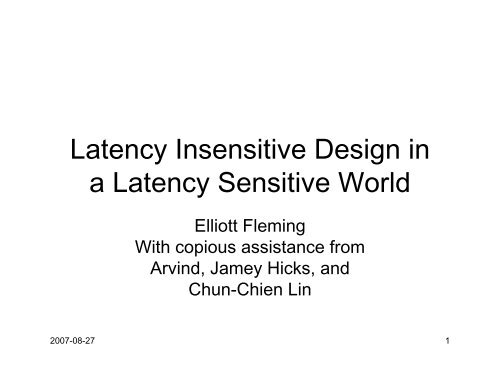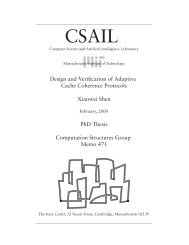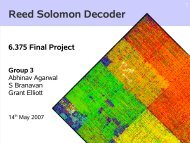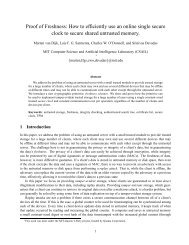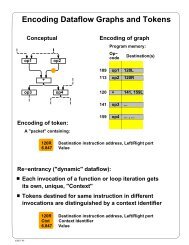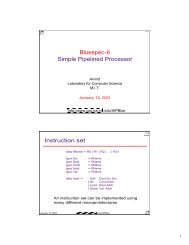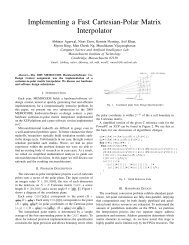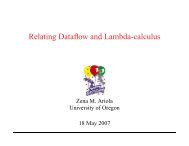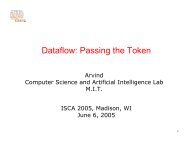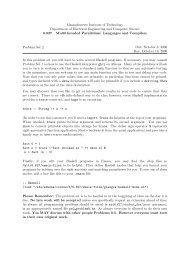Latency Insensitive Design in a Latency Sensitive World - MIT
Latency Insensitive Design in a Latency Sensitive World - MIT
Latency Insensitive Design in a Latency Sensitive World - MIT
Create successful ePaper yourself
Turn your PDF publications into a flip-book with our unique Google optimized e-Paper software.
<strong>Latency</strong> <strong>Insensitive</strong> <strong>Design</strong> <strong>in</strong><br />
a <strong>Latency</strong> <strong>Sensitive</strong> <strong>World</strong><br />
Elliott Flem<strong>in</strong>g<br />
With copious assistance from<br />
Arv<strong>in</strong>d, Jamey Hicks, and<br />
Chun-Chien L<strong>in</strong><br />
2007-08-27 1
<strong>Latency</strong> Sensitivity<br />
• May require less logic<br />
– But sav<strong>in</strong>gs is m<strong>in</strong>imal<br />
• Many modules/Implementers<br />
– <strong>Design</strong>ers make undocumented tim<strong>in</strong>g<br />
assumptions<br />
– Do the assumptions of one effect the other?<br />
– When are these assumptions exposed?<br />
• Modular ref<strong>in</strong>ement<br />
– Major implementation ga<strong>in</strong>s possible<br />
– Does ref<strong>in</strong>ement affect design correctness?<br />
2007-08-27 2
<strong>Sensitive</strong> Vs. <strong>Insensitive</strong><br />
Bus<br />
Interface<br />
Execute<br />
Memory<br />
What if Execute takes<br />
5 cycles? 3 cycles?<br />
2007-08-27 3
<strong>Latency</strong> Insensitivity<br />
• Tak<strong>in</strong>g a data centric approach<br />
– Tim<strong>in</strong>g is irrelevant, operations should occur only<br />
when data is available<br />
– Modules can be ref<strong>in</strong>ed <strong>in</strong>dividually<br />
– Bluespec has no semantic notion of clock<br />
• Lots of examples <strong>in</strong> hardware and software<br />
– Bus protocols<br />
• Takes extra logic to control the data flow<br />
– But Bluespec automatically generate this<br />
2007-08-27 4
Some LI Practices<br />
• Bounded Kahnian networks<br />
– All <strong>in</strong>puts available before operation beg<strong>in</strong>s<br />
– Suffcient space to buffer outputs<br />
• Transmit Data and Control together<br />
• Ready / Enable protocol<br />
2007-08-27 5
H.264 Memory: Basic configuration<br />
NAL<br />
unwrap<br />
Intra<br />
Prediction<br />
Inter<br />
Prediction<br />
Parse/<br />
CAVLC<br />
CAVLC<br />
Memory<br />
Ref<br />
Frames<br />
Parameter<br />
Memory<br />
Deblock<br />
Filter<br />
Inverse<br />
Quant<br />
Transformation<br />
Scale /<br />
YUV2RGB<br />
Output<br />
Buffer<br />
2007-08-27 6
H.264 Memory and LI<br />
• H.264 uses a variety of memories of different<br />
sizes and access frequencies<br />
– SRAM? DRAM? Private? Multiplexed?<br />
• Different performance/price requirements for<br />
different modules<br />
– Shared DRAM may be cheaper<br />
– Dedicated SRAM may use less energy<br />
• Modules should make no assumptions about<br />
memory response times<br />
– Otherwise, rapid design explorations may not be<br />
possible<br />
2007-08-27 7
H.264 – Another Memory Configuration<br />
NAL<br />
unwrap<br />
Intra<br />
Prediction<br />
Inter<br />
Prediction<br />
Parse/<br />
CAVLC<br />
Internal<br />
SRAM<br />
Memory<br />
Deblock<br />
Filter<br />
External<br />
DRAM<br />
Memory<br />
Inverse<br />
Quant<br />
Transformation<br />
Scale /<br />
YUV2RGB<br />
2007-08-27 8
<strong>Latency</strong> Insensitivity and Bluespec<br />
• <strong>Latency</strong> <strong>in</strong>sensitivity easy <strong>in</strong>side of Bluespec<br />
– SRAM p<strong>in</strong>outs tend not to <strong>in</strong>clude RDY/EN<br />
• Can handle latency sensitive components,<br />
– But prefer the latency <strong>in</strong>sensitive modality<br />
• What are some good mechanisms for handl<strong>in</strong>g<br />
Bluespec <strong>in</strong>terfaces to the outside world?<br />
• Key idea: When to perform latency sensitive<br />
operation<br />
– Like a bounded Kahnian network<br />
2007-08-27 9
<strong>Latency</strong> <strong>Insensitive</strong> BRAM<br />
• Memories are usually external<br />
to Bluespec<br />
– Generated RAMs<br />
– External RAMs<br />
• BRAM<br />
– Synchronous, Dual-ported<br />
SRAM<br />
– Primitive FPGA component<br />
• Wrapp<strong>in</strong>g a Pipel<strong>in</strong>ed BRAM<br />
– Keep an <strong>in</strong>ternal counter of <strong>in</strong>flight<br />
requests<br />
– Allow requests if room <strong>in</strong> the<br />
response buffer<br />
– To ma<strong>in</strong>ta<strong>in</strong> throughput, buffer<br />
must be as large as latency<br />
rdy en<br />
reqCnt<br />
rdy en<br />
reqIn<br />
Addr/Data<br />
outQ<br />
respOut<br />
BRAM<br />
2007-08-27 10<br />
req<br />
resp<br />
RAM latency=4
LI BRAM – Bluespec Side<br />
• Synthesis tools are<br />
picky about BRAMs<br />
• Import<strong>in</strong>g Verilog<br />
– Legacy modules<br />
– Library primitives<br />
• Three methods<br />
– Read Request<br />
– Write Request<br />
– Read Response<br />
• Use schedule to<br />
specify schedul<strong>in</strong>g<br />
constra<strong>in</strong>ts<br />
import "BVI" BRAM = module<br />
mkBRAM_NonZero#(Integer low, Integer<br />
Parametric<br />
high)(BRAM#(idx_type, data_type)) provisos<br />
(Bits#(idx_type, idx),Bits#(data_type, data),<br />
Literal#(idx_type));<br />
default_clock clk(CLK);<br />
parameter addr_width = valueof(idx);<br />
parameter data_width = valueof(data);<br />
parameter lo = low;<br />
parameter hi = high;<br />
method DOUT read_resp() ready(DOUT_RDY<br />
enable(DOUT_EN);<br />
method read_req(RD_ADDR) ready(RD_RDY)<br />
enable(RD_EN);<br />
method write(WR_ADDR, WR_VAL) enable(WR_EN);<br />
schedule read_req CF (read_resp, write);<br />
schedule read_resp CF write;<br />
path(DOUT_EN,RD_RDY);<br />
endmodule<br />
2007-08-27 11
LI BRAM – Verilog Side<br />
module BRAM(CLK, RST_N,RD_ADDR,<br />
RD_RDY, RD_EN, DOUT, DOUT_RDY,<br />
DOUT_EN, WR_ADDR, WR_VAL, WR_EN);<br />
parameter addr_width = 1,data_width = 1;<br />
parameter lo = 0, hi = 1<br />
<strong>in</strong>put CLK, RST_N;<br />
// Read Port<br />
<strong>in</strong>put [addr_width - 1 : 0] RD_ADDR;<br />
<strong>in</strong>put RD_EN;<br />
output RD_RDY;<br />
// Read Resp Port<br />
output [data_width - 1 : 0] DOUT;<br />
output DOUT_RDY;<br />
<strong>in</strong>put DOUT_EN;<br />
// Write Port<br />
<strong>in</strong>put [addr_width - 1 : 0] WR_ADDR;<br />
<strong>in</strong>put [data_width - 1 : 0] WR_VAL;<br />
<strong>in</strong>put WR_EN;<br />
reg [data_width - 1 : 0] arr[lo:hi];<br />
reg RD_REQ_MADE;<br />
reg [data_width - 1 : 0] RAM_OUT;<br />
reg [1:0] CTR;<br />
FIFOL2#(.width(data_width)) q(<br />
.RST_N(RST_N), .CLK(CLK),<br />
.D_IN(RAM_OUT),.ENQ(RD_REQ_MADE),<br />
.DEQ(DOUT_EN), .CLR(1'b0),<br />
2007-08-27 12<br />
.D_OUT(DOUT),.FULL_N(),<br />
.EMPTY_N(DOUT_RDY));<br />
assign RD_RDY = (CTR > 0) || DOUT_EN;<br />
always@(posedge CLK)<br />
beg<strong>in</strong><br />
if (!RST_N)<br />
beg<strong>in</strong><br />
CTR
<strong>Latency</strong> <strong>Insensitive</strong> Bus<br />
• PLB Master<br />
– Fast Memory Bus<br />
– Embedded<br />
• <strong>Latency</strong> Insensitivity<br />
– Support different backends<br />
• Challenges<br />
– Burst transfer<br />
– Bus errors<br />
– Fixed latency response<br />
times<br />
• More complex example<br />
– But same pr<strong>in</strong>ciples apply<br />
2007-08-27 13
<strong>Latency</strong> <strong>Insensitive</strong> Bus<br />
• Burst transfer<br />
– Provide space to buffer the<br />
entire data of the transaction<br />
• Bus errors<br />
– Can’t allow bus <strong>in</strong>put to<br />
immediately escape to module<br />
• Fixed latency response times<br />
– Strict <strong>in</strong>put – compute – output<br />
method/rule order<strong>in</strong>g<br />
– Requires RWires<br />
• Same pr<strong>in</strong>ciples apply<br />
– Transaction start requires all<br />
<strong>in</strong>puts<br />
– Sufficient buffer<strong>in</strong>g for output<br />
– Transaction complete asserts<br />
all outputs valid<br />
2007-08-27 14
Questions?<br />
kflem<strong>in</strong>g@mit.edu<br />
2007-08-27 15


